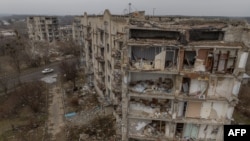On March 27, Russia’s RIA Novosti state news agency published two articles about the United Nations’ most recent report on the human rights situation in Ukraine, which covered the period December 1, 2023, to February 29, 2024.
While most of the U.N. report was devoted to Russian human rights violations in Ukraine, RIA Novosti ignored that, focusing only on the U.N. report’s criticism of violations by the Ukrainian side. In particular, the Russian news agency reported that 13 Russian POWs interviewed by U.N. officials claimed their Ukrainian captors tortured them during interrogation.
On March 28, RIA Novosti published an article headlined “Peskov commented on the UN report on the torture of the Russian servicemen in Ukraine,” which cited Kremlin spokesman Dmitry Peskov.
"Peskov, commenting on the U.N. report on the torture of Russian prisoners of war in Ukraine, said that this is not news for Moscow, all crimes of the Kyiv regime are documented,” the RIA Novosti article stated.
It also quoted Peskov as saying: “Of course, we will ensure that those who are behind these crimes are properly punished.”
That is misleading. The U.N. report primarily focused on Russian human rights abuses in the areas of Ukraine under Russian control.
The U.N. Office of the High Commissioner for Human Rights (OHCHR) released the report, its thirty-eighth on the human rights situation in Ukraine, on March 26.
The report, based on the work of the U.N. Human Rights Monitoring Mission in Ukraine (HRMMU), stated that the Russian military’s invasion and occupation of parts of Ukraine have been accompanied by serious violations of international human rights and humanitarian law.
According to the report, Russian shelling of Ukrainian territory between December 1, 2023, and February 29, 2024, led to an increase in civilian casualties compared to previous months.
The OHCHR verified 1,804 civilian casualties in Ukraine during the specified period, 712 of whom were injured as a result of shelling. Russian actions in Ukraine killed “at least 429 civilians (232 men, 181 women, 10 boys and 6 girls) and injured 1,375 (717 men, 576 women, 50 boys and 32 girls),” the report stated.
According to the OHCHR report, Kharkiv, which was subjected to numerous Russian attacks, suffered the most. Civilian areas around Kupiansk in the Kharkiv region, Avdiivka in the Donetsk region, and Kherson were severely damaged, and several cities and towns along the front line reportedly were virtually destroyed.
The majority of casualties were caused using explosives in populated areas, and a disproportionate share of the dead and wounded were elderly people, especially in areas close to the front line, the U.N monitors found.
They also recorded damage to or destruction of “106 educational facilities and 28 health care facilities.”
In addition, the U.N. interviewed 60 Ukrainian men who were recently released from Russian captivity, in which they spent from several weeks to almost two years.
“Their accounts reinforced previously documented patterns of widespread torture or inhuman or degrading treatment or punishment of Ukrainian POWs in Russian captivity, as well as conditions of detention that fail to comply with international law,” the report’s authors emphasized.
The OHCHR report stated that during the period between December 1, 2023, and February 29, 2024, the U.N. received reports of 12 incidents in which at least 32 recently captured Ukrainian prisoners of war were executed.
The U.N. also reported that Russian occupation authorities in the Donetsk and Luhansk regions pressured men to enlist in the ranks of the Russian armed forces and sign contracts with the Russian Defense Ministry.
Russian forces also pressured residents of the occupied territories to obtain Russian citizenship and passports, both directly, through threats and intimidation, and indirectly. Some of the people that the U.N. mission interviewed said those without Russian passports faced restrictions on access to government services, health care and employment.
Several Ukrainian media outlets noted that the U.N. report alleges that Russian prisoners were tortured by Ukrainians and Russian servicemen “hors de combat” (temporarily or permanently unable to perform their combat duties) were executed.
Glavcom.ua, a popular Ukrainian website that has been blocked in Russia for the last ten years, reported that the U.N. “was actively concerned with the fate of the Russian military, who came to a foreign land to kill Ukrainians.” The website noted that Russian POWs were interviewed by the U.N. Human Rights Monitoring Mission inside Ukraine because "Ukraine, unlike the occupying country, granted the U.N. mission full access to the official internment centers where Russian prisoners of war were held."





